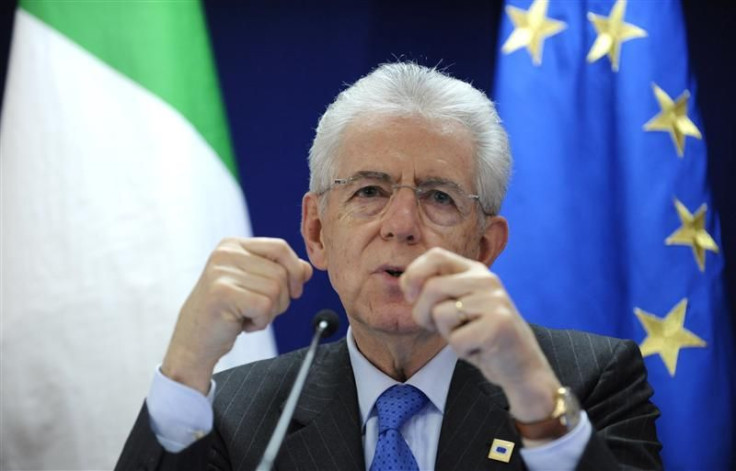Italy In Recession, Headache For Prime Minister Monti

(REUTERS) - Italy is in recession, final data confirmed on Monday, underscoring the difficulties facing Mario Monti's technocrat government as it grapples with a shrinking economy dragged down by austerity measures and a debt crisis.
Italy's economy shrank 0.7 percent in the fourth quarter of 2011, following a 0.2 percent decline in gross domestic product in the third quarter.
Monti, who rushed through a 33 billion euro austerity plan in December and is now working on reforms to boost growth, is due to meet Germany's Chancellor Angela Merkel on Tuesday for talks in Rome.
Germany's economy contracted by 0.2 percent in the fourth quarter, but analysts are expecting Europe's largest economy to pick up steam again this year, while Italy is seen lagging.
Weak consumption in the euro zone's third largest economy weighed heavily in the fourth quarter, while investments and inventories also declined but net exports contributed positively.
Domestic demand is the weakest link, the area hardest hit by fiscal tightening, said Paolo Mameli from Intesa Sanpaolo, who said GDP would likely decline by a similar rate in the first quarter of 2012.
Italy's national statistics office ISTAT said GDP fell 0.4 percent year-on-year in the fourth quarter, revising a preliminary estimate of a 0.5 percent fall.
The data lagged a euro zone average of -0.3 percent quarter on quarter and 0.7 percent year-on-year. Economic indicators are pointing to a further slowdown for most of 2012 in Italy, which has been the most sluggish economy in the euro zone over the last decade.
The Organisation for Economic Co-operation and Development said on Monday there were tentative signs of economic improvement in the euro zone.
Analysts polled by Reuters in January expected GDP to shrink by about 0.6 percent in the first quarter of this year.
Data last week showed industrial output was much weaker than expected in January, plunging 2.5 percent and marking an extremely poor start to the year.
The Bank of Italy forecasts a 1.5 percent full-year contraction in 2012, far steeper than the government's official projection of -0.4 percent.
Monti's austerity measures including spending cuts, tax hikes and pension reform and are aimed at balancing the budget in 2013, though critics say they will weigh on Italy's already chronically low growth rates.
Market concerns about the sustainability of the country's 1.9 trillion euro public debt have calmed since Monti replaced Silvio Berlusconi in November and yields on Italy's 10 year bonds have fallen to below 5 percent from peaks close to 8 percent at the end of 2011.
Monti is now working on measures to stimulate the economy, and his government is due to meet with unions and employers on Monday to discuss a labor market reform to follow deregulation measures announced in January.
(Editing by Jeremy Gaunt.)
© Copyright Thomson Reuters 2024. All rights reserved.











